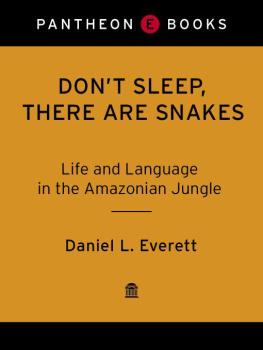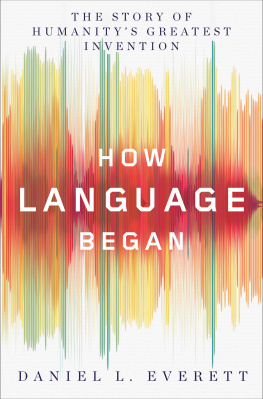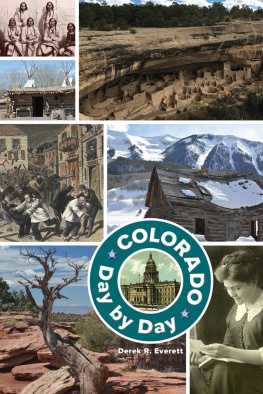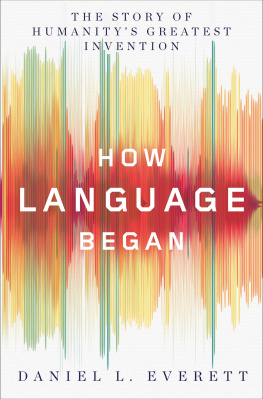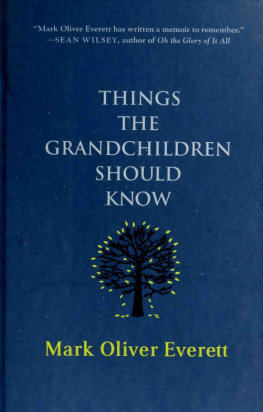
Dont Sleep, There Are Snakes
Contents
This book is about past events. But life is about the present and the future. And so I dedicate this book to my wife, Linda Ann Everett, the constant encourager. Romance is a good thing.
I thus learnt my first great lesson in the inquiry into these obscure fields of knowledge, never to accept the disbelief of great men or their accusations of imposture or of imbecility, as of any weight when opposed to the repeated observation of facts by other men, admittedly sane and honest. The whole history of science shows us that whenever the educated and scientific men of any age have denied the facts of other investigators on a priori grounds of absurdity or impossibility, the deniers have always been wrong.
ALFRED WALLACE (18231913)
The notion that the essence of what it means to be human is most clearly revealed in those features of human culture that are universal rather than in those that are distinctive to this people or that is a prejudice that we are not obliged to share.... It may be in the cultural particularities of peoplein their odditiesthat some of the most instructive revelations of what it is to be generically human are to be found.
CLIFFORD GEERTZ (19262006)
Some Notes on the Pirah
Language as Used in This Book
Although Pirah has one of the smallest set of speech sounds (phonemes) known, it can still be very difficult to pronounce without a little help. Here is a rudimentary guide to pronunciation, using the writing system that my missionary predecessors to the Pirahs, Arlo Heinrichs and Steve Sheldon, and I developed for the language.
b Pronounced at the beginning of a word like the m in mama . Between the vowels i and o it is pronounced as a trill, with the lips vibrating (as in some American childrens imitation of a car motor running). Elsewhere it is pronounced like the b of baby.
g Pronounced at the beginning of a word like the n of no . Between the vowels o and i, as in the word xibogi (milk), it can be pronounced as either g or an l -like sound found in no other language of the world, where one makes an l but then lets the tongue continue out between the lips to touch the bottom of the tongue on the lower lip. Elsewhere, it is pronounced like the g in god.
p Pronounced like the p sound in English words like pot .
t Pronounced like the English sound in tar.
t Pronounced like the English sound in skirt.
x This is a glottal stop. It is pronounced like the medial sound in the English negative interjection uh-uh: Do you have any sugar? Uh-uh (the sound where the - is). This is not a full consonant in English and is not represented in the English alphabet. In the International Phonetic Alphabet its symbol is /.
s Pronounced like the English s sound in sound, except before the letter i, where it is pronounced like the English sh sound in sugar.
h Pronounced like the American English sound at the beginning of the word here .
i Usually pronounced like the English i vowel in hit, though occasionally like the English e vowel in bed . On some occasions it is pronounced like the ea sequence in bead.
a Pronounced like the British English a vowel in father.
o Usually pronounced like the English o vowel in who , though occasionally the vowel o in abode .
The acute accent () indicates a high tone and is written over a vowel when a high pitch is needed. When there is no symbol above a vowel it has a low pitch. Think of the English words PERmit (a license or form of permission) versus perMIT (to allow). The capitalized syllables normally have high pitch in English. In Pirah, every vowel always has a pitch associated with it, depending on the function or location in the sentence of the word it occurs in.
I have tried in most places to translate Pirah into idiomatic English. This has the consequence of presenting the language differently from the way the people actually speak. For example, many of the translations, unlike the original Pirah sentences, include recursion. Anyone with a keener interest in the grammar can examine the Pirah stories that are included in the book or my many linguistic writings about the Pirahs, such as my chapter in the Handbook of Amazonian Languages, volume 1 (edited by Desmond Derbyshire and Geoffrey Pullum, published by Mouton). The stories in the book will be sufficient for most readers, since they provide literal translations (though these translations are likely to be more difficult for non-Pirah speakers to follow).
Preface
Science is not just about research teams in lab coats working under the direction of an eminent scientist. It can be pursued by lone individuals slogging it out in hard times and hard placesfeeling lost and over their heads, yet challenged to bring new knowledge out of their difficulties.
This book is about scientific work of the latter type and about intellectual growth in the crucible of an Amazonian culture, living among the Pirah (pee-da-HAN) Indians of Brazil. It is about them and the lessons they taught me, both scientific and personal, and how these new ideas changed my life profoundly and led me to live differently.
These are my lessons. Someone else would no doubt have learned other lessons. Future researchers will have their own stories to tell. In the end, we just do the best we can to talk straight and clear.
Prologue
Look! There he is, Xigaga, the spirit.
Yes, I can see him. He is threatening us.
Everybody, come see Xigaga. Quickly! He is on the beach!
I roused from my deep sleep, not sure if I was dreaming or hearing this conversation. It was 6:30 on a Saturday morning in August, the dry season of 1980. The sun was shining, but not yet too hot. A breeze was blowing up from the Maici River in front of my modest hut in a clearing on the bank. I opened my eyes and saw the palm thatch above me, its original yellow graying from years of dust and soot. My dwelling was flanked by two smaller Pirah huts of similar construction, where lived Xahobisi, Khoibiihai, and their families.
Mornings among the Pirahs, so many mornings, I picked up the faint smell of smoke drifting from their cook fires, and the warmth of the Brazilian sun on my face, its rays softened by my mosquito net. Children were usually laughing, chasing one another, or noisily crying to nurse, the sounds reverberating through the village. Dogs were barking. Often when I first opened my eyes, groggily coming out of a dream, a Pirah child or sometimes even an adult would be staring at me from between the paxiuba palm slats that served as siding for my large hut. This morning was different.
I was now completely conscious, awakened by the noise and shouts of Pirahs. I sat up and looked around. A crowd was gathering about twenty feet from my bed on the high bank of the Maici, and all were energetically gesticulating and yelling. Everyone was focused on the beach just across the river from my house. I got out of bed to get a better lookand because there was no way to sleep through the noise.
I picked my gym shorts off the floor and checked to make sure that there were no tarantulas, scorpions, centipedes, or other undesirables in them. Pulling them on, I slipped into my flip-flops and headed out the door. The Pirahs were loosely bunched on the riverbank just to the right of my house. Their excitement was growing. I could see mothers running down the path, their infants trying to hold breasts in their mouths.
The women wore the same sleeveless, collarless, midlength dresses they worked and slept in, stained a dark brown from dirt and smoke. The men wore gym shorts or loincloths. None of the men were carrying their bows and arrows. That was a relief. Prepubescent children were naked, their skin leathery from exposure to the elements. The babies bottoms were calloused from scooting across the ground, a mode of locomotion that for some reason they prefer to crawling. Everyone was streaked from ashes and dust accumulated by sleeping and sitting on the ground near the fire.
Next page
